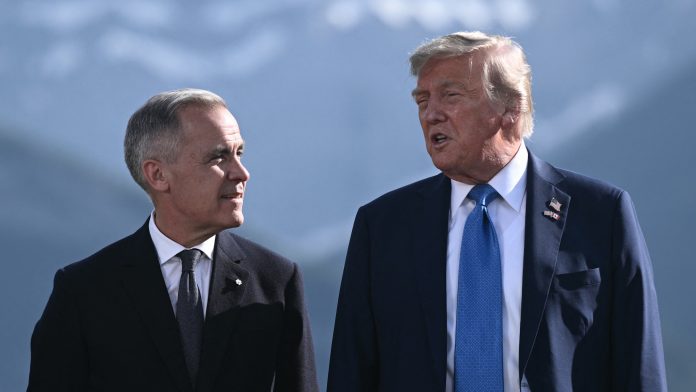Canada has backed off a planned digital services tax targeting major U.S. technology companies, just hours before it was set to take effect, in an effort to revive stalled trade talks with the United States. Initially scheduled for collection starting Monday, June 30, the tax would have imposed a 3% levy on revenue from Canadian users by digital platforms generating more than $20 million annually.
The measure was expected to apply retroactively in 2022 and would have impacted companies such as Amazon, Apple, Meta and Google.
How did the US and Canada respond to the tax plan?
President Donald Trump suspended trade negotiations with Canada, calling the proposed tax “a direct and blatant attack.” Trump agreed to resume negotiations after a phone call with Canadian Prime Minister Mark Carney on Sunday, June 29.
Finance Minister François-Philippe Champagne said he made the move “in anticipation” of a broader agreement and plans to introduce legislation to repeal the Digital Services Tax Act.
“Canada’s new government is focused on building the strongest economy in the G7 and standing up for Canadian workers and businesses,” Champagne said in a statement. “Rescinding the digital services tax will allow the negotiations of a new economic and security relationship with the United States to make vital progress and reinforce our work to create jobs and build prosperity for all Canadians.”
What are the new goals for US-Canada trade talks?
Both leaders aim to reach a new trade deal by July 21, aligning with a 30-day timeline discussed earlier this month at the G7 summit in Alberta.
Canadian officials emphasized that repealing the tax will clear the way for a comprehensive economic and security partnership with the U.S.
Canada remains the largest buyer of American goods and the second-largest overall trading partner, after Mexico.
What are the broader trade tensions?
The digital services tax dispute is one piece of a broader trade conflict between the U.S. and its allies. Since returning to the office, Trump has reinstated tariffs on Canadian steel and aluminum and added duties on autos and other goods.
A 90-day pause on most global tariffs — intended to give time for bilateral negotiations — expires on July 9. Trump said he wouldn’t extend the pause.
In a Fox News interview, he said countries will soon receive letters warning that tariffs will take effect unless deals are reached. “We’ll look at how a country treats us,” Trump said. “Congratulations, we’re allowing you to shop in the United States of America, you’re going to pay a 25% tariff, or a 35% or a 50% or 10%.”
The administration initially set a goal of “90 deals in 90 days.” With the deadline approaching, Canadian officials say resolving trade tensions remains a priority.
Without a deal, more U.S. tariffs could take effect shortly after July 9.
How has the decision been received?
Analysts call the tax reversal a political win for Trump and U.S. tech firms.
Daniel Béland, a political science professor at McGill University, said the retreat shows that Canada bowed to Washington’s pressure.
“President Trump forced PM Carney to do exactly what big tech wanted,” Béland said.

